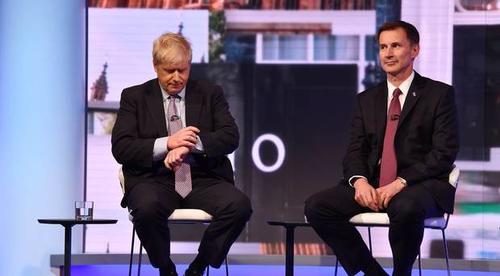
On June 7, British Prime Minister Theresa May resigned as leader of the Conservative Party. Today, in the last of five votes conducted over the past week, the 313 Conservative MPs chose Boris Johnson, the former mayor of London and former Foreign Secretary, and Jeremy Hunt, the current Foreign Secretary, as the two candidates from whom the party’s 160,000 members will choose the new leader in a postal vote. Johnson led the other candidates by a substantial margin in all five votes and, given the even greater support he enjoys among party members, there can be little doubt that when the result of the postal vote is announced in late July, he will be the party’s leader and, in that capacity, will replace May as prime minister.
Under the rules adopted by the Conservative Private Members Committee – aka the 1922 Committee – those wishing to be considered candidates for the leadership had to be nominated by eight MPs on June 10. Faced with a slew of potential candidates, the ’22, as it is colloquially known, stipulated that a candidate would not only have to be nominated by eight MPs instead of the previously-required two MPs but also would have to obtain more than 5 per cent of the votes on the first ballot – i.e., 17 – to participate in the second ballot and more than 10 per cent of the votes on the second ballot – i.e., 33 – to participate in the third ballot. And it stipulated that on those and all later ballots, the lowest-placed candidate would be eliminated until there were only two left, after which the party members would one as the new leader.
Ten candidates were nominated. In the first ballot, conducted last Thursday, Johnson received 114 votes; Hunt 43; Michael Gove, Environment Secretary, 37; Dominic Raab, former Brexit Secretary, 27; Sajid Javid, Home Secretary, 23; Matt Hancock, Health Secretary, 20; Rory Stewart, International Development Secretary, 19; Andrea Leadsom, former Leader of the House, 11; Mark Harper, former Chief Whip, 10; and Esther McVey, former Work and Pensions Secretary, 9. Leadsom, Harper, and McVey were eliminated. Hancock withdrew prior to the second ballot.
In the second ballot, conducted on Tuesday, Johnson received 126 (+12); Hunt 46 (+3); Gove 41 (+4); Stewart 37 (+18); Javid 33 (+10); and Raab 30 (+3). As lowest-placed candidate, Raab was eliminated. In the third ballot, conducted yesterday, Johnson received 143 (+17); Hunt 54 (+8); Gove 51 (+10); Javid 38 (+5); and Stewart 27 (-10). Stewart was eliminated.
In the fourth ballot, conducted this morning, Johnson received 157 (+14); Gove 61 (+10); Hunt 59 (+5); and Javid 34 (-4). (There were two spoiled ballots.) Javid was eliminated. In the fifth and final ballot this afternoon, Johnson received 160 (+3); Hunt 77 (+18); and Gove 75 (+14). (There was one spoiled ballot.) Gove was eliminated. The party will now conduct a postal vote asking its members to indicate their choice for leader between Johnson and Hunt. The winner is expected to be announced during the week of July 22-26, shortly before the Parliament’s summer recess.
Hunt would bring considerable experience in government to the positions of party leader and prime minister, having served as Culture Secretary in 2010-12, Health Secretary in 2012-18, and Foreign Secretary since last July, after Johnson resigned in a huff after the important all-day Cabinet meeting at Chequers at which May revealed the contours of what would become the EU withdrawal agreement and the political declaration about the future relationship between the UK and EU. Johnson’s experience in government is limited to his two years as Foreign Secretary, although he did, of course, also serve eight years, from 2008 to 2016, as mayor of London.
But notwithstanding Hunt’s considerable experience, there can be little doubt that, barring some egregious gaffes and missteps (from which he is not immune), the party members will elect Johnson as their leader. One indication of the likely outcome can be found in a YouGov poll of nearly 900 Conservative Party members conducted last week. Asked whether they thought each candidate would or would not be a good party leader, 77 per cent thought Johnson would be a good party leader while 19 per cent thought he’d be a poor leader, a net positive of 58 per cent. In contrast, while 56 per cent thought Hunt would be a good leader, 37 per cent thought he’d be a bad leader, a net positive of 18 per cent.
Today, in endorsing Johnson, the Evening Standard, edited by George Osborne, the pro-Remain Chancellor of the Exchequer in the government that inflicted the Brexit saga on the UK and the EU, said, “ask yourself which of these potential prime ministers is most likely to persuade the Conservative Party to vote for a repackaged version of the existing deal; the one with the greatest credibility with hard Brexiteers.” It concluded with words that will resonate with much of the Conservative Party membership, which, for better or worse, constitutes the electorate for choosing the UK’s next prime minister: “If there’s one of these candidates who can give Britain back its mojo, it’s BoJo.”
David R. Cameron is a professor of political science and the director of the Yale Program in European Union Studies.

